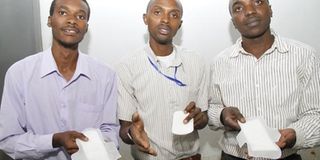Give us rice straw and we’ll make baby diapers and sanitary towels

From left, Martin Murigi, Moses Mathenyu and Edwin Madivoli, Analytical and Environmental Chemistry Masters students at Jomo Kenyatta University of Agriculture and Technology, with sanitary pads and diapers they make from crop waste. PHOTO | JEFF ANGOTE |
What you need to know:
- The students collect the raw materials and thoroughly dry them.
- They are then ground into fine particles and treated with various chemicals to extract cellulose.
- The polymers are put in non-woven cotton fabrics to come up with final products.
Seated in a small tent at the Nyeri Agricultural Trade Fair recently, the three young men dressed in white overcoats waited eagerly for the show-goers to approach them.
On a table in the tent were small bundles of dried papyrus reeds, banana stalks, rice straw and water hyacinth — their raw materials.
And there were several paraphernalia that included pipettes besides the materials. The tent looked more of a small laboratory than anything else.
Moses Mathenyu, Edwin Madivoli and Martin Murigi were at the trade fair to exhibit their biodegradable sanitary pads and diapers agricultural waste.
The Jomo Kenyatta University of Agriculture and Technology (JKUAT) second year Masters of Science students make the pads and diapers from papyrus reeds, banana stalks, rice straw and water hyacinth.
“We came up with the innovations to help rural women especially. Ours are not the first ones since there is someone who is making sanitary pads from banana waste, but they are unique because we use a variety of agricultural waste and make baby diapers,” Mathenyu says.
How do they manage to pull this feat?
The students of Analytical and Environmental Chemistry collect the raw materials and thoroughly dry them.
They are then ground into fine particles and treated with various chemicals to extract cellulose, which is needed for making super-absorbent polymers for diapers and sanitary pads.
The polymers are put in non-woven cotton fabrics to come up with final products.
The sanitary pads and diapers are suited to different kinds of people and are classified into light, medium and heavy.
The students have taken their idea to the Kenya Industrial Property Institute with a view to having it patented.
If endorsed and commercialised, Madivoli says, the innovation will provide efficient products for the low-end market.
BIGGEST BENEFICIARIES
“We have done an analysis and found out that the towels will be cheaper than what is in the market because we use locally available materials. A twin-pack of 20 can profitably retail at Sh80.”
Once patented, the students, through JKUAT, intend to invite investors willing to partner with them.
“If commercialised, the project will create an industry that will offer employment opportunities.”
But banana and rice farmers could be the biggest beneficiaries as they will be able to earn cash from what they consider waste.
“Water hyacinth has become a menace, but here we have a chance to make it economically beneficial.”
The weed has mainly affected Lake Victoria in Kisumu County, hampering transport, fishing and becoming a breeding ground for various pests.
Madivoli says they plan people to harvest the water weed from the lake and sell to them.
The student’s greatest challenge has been lack of funds to actualise the project.
“We have so far received up to Sh100,000 funding from JKUAT to work on the project. We are really grateful, but we now need to take the project forward,” says Murigi.
They are hope to get funding from JKUAT’s Innovation Fund and a grant from the National Council of Science Technology and Innovation, he says, adding: “A small pilot project would require approximately Sh1 million before commencement of large-scale production.”
“A gram of the polythetic material produced as a final product is able to absorb 20 times its weight. For instance, one gram of polymer absorber will absorb 20g of liquid,” JKUAT chemistry Professor Patrick Kareru, who guided the three students through the project, says.
The don notes that the super-absorbent substance has undergone thorough laboratory analysis to ensure it is working and that it has no effect on users.
According to Prof Kareru, most diapers and sanitary towels in the market are made from petroleum products, which pose serious health risks to the users — babies and women.
“Petroleum products do not decompose quickly and can last up to 1,000 years even after disposal thus becoming a threat to the environment. These diapers and towels are bio-degradable.”
HAVE GREAT IDEAS
He reveals that so far, investors from US and Britain have expressed interest in taking part in the development of large-scale processing of the sanitary pads and diapers and that negotiations are underway.
“There is much potential in young people. They have great ideas that if nurtured can help Kenya develop, particularly in the agricultural sector where value addition is almost non-existent.”




